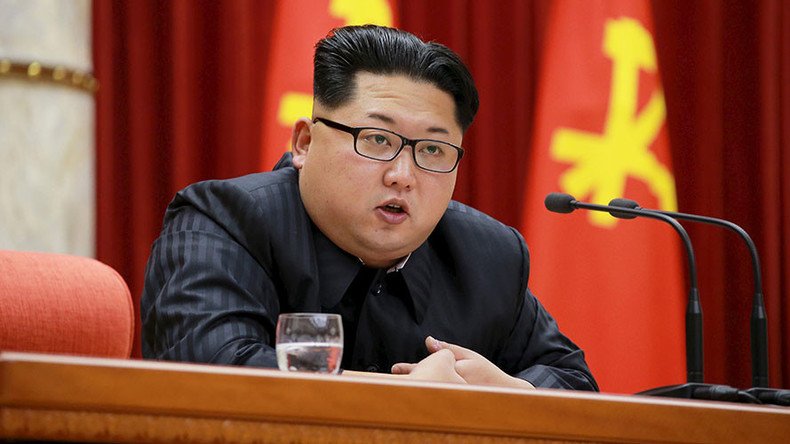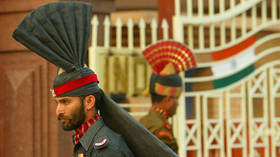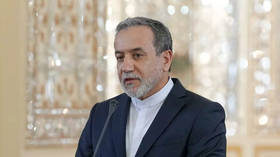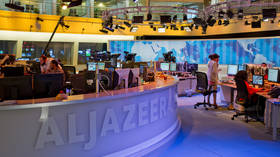‘North Korea is not Syria; it has real retaliatory capabilities’

Donald Trump’s constituency and his militaristic posturing all suggest he may want to undertake some military action against Pyongyang, which is going to make matters a lot worse, says Sreeram Chaulia from the Jindal School of International Affairs.
North Korea claims it had tested its first intercontinental ballistic missile on Tuesday morning, according to reports it fell into the Sea of Japan, after flying around 535 kilometers.
The Russian Defense Ministry, however, revised that report, stating that North Korea had launched an intermediate range missile, which "did not pose a threat to the Russian Federation.”
Japan filed a protest, saying the launch breaches UN resolutions.
RT: A couple of days ago Donald Trump said again that he sees North Korean missile tests as a threat. What might be Trump's response to this latest test?
Sreeram Chaulia: Trump appears to be at his wit's end. On the one hand, he has threatened military action against North Korea as a kind of preemption. On the other hand, he has tried to use China to apply pressure on North Korea to refrain from more missile tests and nuclear weapons tests. I think North Korea is undeterred because it believes there is a moral hazard issue here, where China no matter how provocative North Korea becomes, at the end of the day has to support North Korea, because it believes it is essential for strategic balance in Asia against American encroachment. Kim Jong-un is in a way also challenging China by saying: “Listen, if you go over to the American side and apply pressure on me that is not going to work either."
In a way, the circumstances are pushing Trump toward only one option, which is to try and open a direct hotline of communication with North Korea. Kim Jong-un continues to defy military/diplomatic pressure and even sanctions. China has been trying to enforce more sanctions on North Korea, but that’s not stopping Kim Jong-un.
BREAKING: Missile launched by #northkorea was intermediate range, not ICBM – Russian Defense Ministry https://t.co/wrQDxky7Iipic.twitter.com/myh4LviiMJ
— RT (@RT_com) July 4, 2017
I think he’s saying through all these tests: “Come and talk to directly.” That is what the North Koreans want – direct bilateral talks with the US and possibly involve other players in the region. I think the North Koreans are looking for a bargain. This is a way of saying: "Give me a deal, and I will think about it." But of course, history shows that those have not worked. So it is a Catch-22 kind of situation, and Trump doesn’t have very many good options on the table right now.
RT: Trump has warned that he is willing to put pressure on North Korea on his own. Does it mean that we might see an escalation of tensions between the two countries?
SC: It is quite possible because Trump believes he needs to discard the old policies that had been adopted by Washington for decades toward North Korea and do something new. His constituency and his militaristic posturing all suggest that he may have wanted to undertake some military action, which is going to make matters a lot worse. North Korea has retaliatory capabilities; it is not like Syria. To that extent, there is a real good chance that unthinkingly he will make matters worse than they under way right now.
On the other hand, if he were able to work with China, there may still be a possibility. Although, the Chinese have “disappointed Trump” already by not delivering on what he wants. That is the real crux of the problem: there is no trust between China and the US. If there was, they could have managed and somehow smothered the North Korean problem. I think Trump is staring at one option, which is either a preemptive military strike, which will not work; or some backdoor channel other than an open channel with North Korea, which might work.
‘Nothing better to do with life?’ Trump mocks Kim Jong-un after Pyongyang’s latest missile test https://t.co/EvLYvGUmDgpic.twitter.com/Vogymbg0uX
— RT (@RT_com) July 4, 2017
North Korea and China require the US and South Korea to stop military exercises and stop in a way provoking the North. I don’t think the US will be willing to give up that role because the US has this imperial role in the Asian Pacific by allying with South Korean and Japan and keeping its military presence and force projection in the region. If the North wants those force projections to be rolled back, I don’t think they’re going to get it. So in a way, there is a kind of a clash of interest where neither side is going to be able to get what it wants maximally.
At the most they can do is stop, if not the complete denuclearization of North Korea, the most the Americans can hope for right now is to launch some talks – either through Russia or China - and reach out to the North Korean regime. There have been some signals of lower-level officials trying to contact. Therefore, that may have to be escalated to a higher level. The North loves symbolism. Somebody like Kim Jong-un who is a megalomaniac, he wants to be directly called and talked to by Trump. Trump, being a kind of a non-conformist, an unorthodox president might be willing to do that as well … In a way, this perilous brinkmanship of North Korea might potentially yield something optimistic at the end of the day.
RT: Japanese Prime Minister Abe plans to urge Russian and Chinese leaders during the G20 summit to change their approach toward Pyongyang. What kind of response do you think he will get?
SC: I think the players in the region are more interested in dousing the flames and not increasing them and making it worse. At the end of the day, the US only has 60-70 thousand troops there. But these neighboring countries - Japan, Russia and China - have a direct state because they are direct neighbors of North Korea. Whatever destabilization happens of North Korea – if the regime falls, for example - it will have direct repercussions on these immediate neighboring countries.
BREAKING: North Korea successfully launches intercontinental ballistic missile - state TV https://t.co/co4Oq6O6zOpic.twitter.com/aNyjZgMemH
— RT (@RT_com) July 4, 2017
So they will be looking at what they would consider more constructive approach led by South Korea because under the new liberal presidency of Moon Jae-in they want to try and revive a kind of a sunshine policy, which has been adopted by previous liberal regimes in South Korea a decade ago. In a way, the constellation of all the regional forces is crying out for diplomacy. Trump may not be impervious to that. At the end of the day, he has been advised by his confidants that we cannot adopt a gung-ho, shooting from the hip kind of strategy towards North Korea, because that is going to lead to retaliatory actions and losses to American forces and American prestige.
There is a distinct possibility that North Korea will establish some balance of terror in the region by continuously provoking all these players and it may get its pound of flesh in the end by opening some kind of negotiations. But Trump may want to show some strength before negotiations. So I would not be surprised if there is some limited military action or strikes, or increasing the cyber sabotage...
Before the launch of these missiles and nuclear weapons, the Americans tried to infiltrate North Korean computer systems and install viruses, and somehow slow it down. That probably may be happening simultaneously as we speak, because not every North Korean test has been successful – some of them are failing, and that is probably the result of Western sabotage through cyber means. There is a mix of tools that Trump’s advisors will put before him. But possibly the only one he will be left with in the end, given the circumstances and the structure of realities in the Asia Pacific is dialogue.
The statements, views and opinions expressed in this column are solely those of the author and do not necessarily represent those of RT.












